A fat box arrived in the mail last week—my sister’s book, Closed Adoption Policy in the 1960s: Exploring the construction of motive through fiction by Carol Major. It’s the result of her doctorate in creative writing, published by a company that selects PhD theses and prints them up for sale mainly to university libraries. Someone is going to pick up that academic tome and fall into a wonderful novel.
It’s a bit odd, really, being a poet with a sister who writes novels. (“Are there any more writers in your family?” asked one magazine editor nervously after the publication had accepted pieces from me, my father and Carol.) I guess I have to admit that I felt apprehensive when she first took up writing a few years back, as though she was treading on my turf. After all, she had been the vivacious, popular one with great hair. And right away she was writing better dialogue than I did.
I figured I had two things insulating me from competition. One, that she’s down in Australia and so would be sending her work into quite a different market. The other was that I had a fifteen-year head start on her in terms of publishing books while she had been bringing up a family.
I didn’t realize that I had another publishing advantage—that I was writing poetry instead of novels. Poets whine a lot about the difficulty of finding a publisher. I had to start a publishing company with friends to bring out my own first book. However, though poetry may be marginal in terms of readership, it is paradoxically a little easier to publish it. Nobody expects a book of poetry to sell more than a few hundred copies, so nobody has big expectations. My early books could be published by tiny optimistic presses from Victoria to Fredricton, until I was taken in by the University of Alberta Press.
But novels—they’re fatter, financially more demanding to print and market. Printing five hundred copies doesn’t seem to be an option. The stakes are higher, the expectations steeper. Carol’s novel was taken up promptly by a leading agent in Australia and shopped around to the big publishing houses. But it didn’t quite fit anyon’s season. “We’re not sure how to market it,” she was told. They didn’t think they could sell the fifty thousand copies that would make it worth their while.
And yet, when I opened that box last week, I sat down and read the whole story all over again, absorbed in its characters and lyric description. It’s the story of a woman coming to terms with the fact that she gave a child up for adoption. Carol has caught that cusp of time in the early 70s when a tectonic shift in social attitudes took place. A whole institutional system had existed to find babies for nice families and coerced girls into giving up those babies in order to be “good” and self-sacrificing. Then suddenly, the card house of social attitudes collapsed. Carol makes this story real and vital.
I’m over the sibling rivalry. I would even cheerfully give up my head-start; I wish my sister had been able to write much sooner. She has been caught in a different tectonic shift: the massive financial upheaval of the book-publishing industry in the early 21st century, which feels it can’t afford to gamble (even if every new title is inherently a gamble.) So we end up with the winner-take-all fractal phenomenon described by Nassim Nicholas Taleb, in which one book will account for a massive percentage of sales.
We need more than the literature of best-sellers, and perhaps the technological upheaval in electronic book publishing will allow that to happen. I’m moderately hopeful that, just as my indie musician friends are connecting with audiences in different ways, novelists will be able to do that too. Then readers will be able to find the wonderful other books like Carol’s. But for now—get your university library to order in a copy of “Closed Adoption Policy in the 1960s.” Don’t tell them it’s a novel. Sneak down and read it over lunch.
